|
In an amicus brief before the U.S. Supreme Court earlier this year, Protect The 1st told the Court that curtailing Section 230 of the Communications Decency Act of 1996 “would cripple the free speech and association that the internet currently fosters.” Consistent with that recommendation, the Court today declined various invitations to curtail that law’s important protections for free speech.
Joining with former Sen. Rick Santorum, we demonstrated in our amicus brief that Section 230 – which offers liability protection to computer-services providers that host third-party speech – is essential to enabling focused discussions and keeping the internet from devolving into a meaningless word soup. “If platforms faced liability for merely organizing and displaying user content in a user-friendly manner, they would likely remove or block controversial – but First Amendment protected – speech from their algorithmic recommendations,” PT1st declared. We stated that a vibrant, open discussion must include a degree of protection for sponsors of internet conversations. With Congress always able to amend Section 230 if new challenges necessitate a change in policy, there is no need for the Supreme Court to rewrite that law. The Supreme Court had shown recent interest in reexamining Section 230. That could still happen, but the two cases that were before the Court turned out to be weak vessels for that review. On Thursday, the Court declined to consider reinterpreting this law in Gonzalez v. Google and Twitter v. Taamneh, finding that the underlying complaints were weak. The Court neither expressly affirmed nor rejected our approach, leaving these issues open for another day and another case. Protect The 1st will remain vigilant against future challenges to Section 230 that could undermine the freedom of speech online. Former U.S. Senator Rick Santorum today joined with Protect The 1st to urge the U.S. Supreme Court to reject the petitioners’ argument in Gonzalez v. Google that the algorithmic recommendations of internet-based platforms should make them liable for users’ acts.
Santorum and Protect The 1st told the Court that curtailing Section 230 “would cripple the free speech and association that the internet currently fosters.” As a senator, Santorum had cast a vote for Section 230 to send the bill to President Bill Clinton’s desk for signature in 1996. The Protect The 1st amicus brief informed the Court:
The brief described for the Court the harm to society that would occur if the Court were to disregard Section 230’s inclusion of First Amendment-protected editorial judgments. The brief tells the Court:
And there is no need for the Supreme Court to rewrite Section 230: As amici explained, Congress can choose to amend Section 230 if new challenges necessitate a change in policy. For example, Congress recently eliminated Section 230 immunity when it conflicts with sex trafficking laws, and Congress is currently debating a variety of bills that would address specific concerns about algorithm-based recommendations. The Protect The 1st’s brief states: “The judiciary is never authorized to interpret statutes more narrowly than Congress wrote them, but it is especially inappropriate to do so when Congress is already considering whether and how to amend its own law.” Background: This Protect The 1st amicus brief answers the question before the U.S. Supreme Court in Gonzalez v. Google: “Does Section 230(c)(1) of the Communications Decency Act immunize interactive computer services when they make targeted recommendations of information provided by another information content provider?” Th case pending before the Court centers around the murder of Nohemi Gonzalez, a 23-year-old American who was killed in a terrorist attack in Paris in 2015. A day after this atrocity, the ISIS foreign terrorist organization claimed responsibility by issuing a written statement and releasing a YouTube video that attempted to glorify its actions. Gonzalez’s father sued Google, Twitter, and Facebook, claiming that social media algorithms that suggest content to users based on their viewing history makes these companies complicit in aiding and abetting international terrorism. No evidence has been presented that these services played an active role in the attack in which Ms. Gonzalez lost her life. A district court granted Google’s motion to dismiss the claim based on Section 230 of the Communications Decency Act, a measure that immunizes social media companies from content posted by users. The U.S. Court of Appeals for the Ninth Circuit affirmed the lower court’s ruling. The Supreme Court is scheduled to hear oral arguments Feb. 21. CLICK HERE FOR THE AMICUS BRIEF Protect The 1st Files Amicus Brief in Kurk v. LRCEA Challenging State Forced Association Statute On December 28th, the Protect The 1st Foundation filed an amicus brief in the upcoming case Kristine Kurk v. Los Rios Classified Employees Association. The case is currently being heard in the United States Court of Appeals for the Ninth Circuit and concerns whether the First Amendment protects a public employee’s right to resign union membership at will.
Twenty-five years ago, Kristine Kurk signed a form allowing the Los Rios Community College District to deduct fees from her salary and send them to her union, the Los Rios Classified Employees Association. Recently, when Kurk attempted to resign her membership, the Union used a California statute’s authorization of “organizational security agreements” to force Kurk to remain a full member, including requiring her government employer to seize money from her paycheck and give it to the union. Requiring Kurk to remain a member would mean her dues would be used to support political candidates and legislation that she may have no interest in supporting. In essence, Kurk’s forced membership is akin to forced expression and thus violates the First Amendment. As stated in our amicus brief, “The Ninth Circuit and other courts of appeals have consistently tried to evade the First Amendment’s requirements as articulated in Janus. In doing so, they have blessed ‘maintenance-of-membership’ statutes that burden speech and association at the core of the First Amendment’s protections. Compelled speech and association, whether it lasts a few months or, as in this case, a few years, raises the specter of a First Amendment violation. This Court should grant the petition to affirm Janus’s underlying principle that states and unions may not conspire to compel speech or association on matters of public concern.” For reasons explained at length in our brief, Protect the 1st strongly believes that a law violates the First Amendment when it substantially impedes a union member’s ability to resign his or her membership in response to the union’s spending the member’s dues on speech with which the member disagrees. When the founders drafted the First Amendment forbidding the abridgement of freedom of speech, “pamphlet wars” were common, with opposing sides handing out flyers and inviting passersby to listen to their opinions. Even in this age of tweets, most Americans recognize parks, sidewalks, and other public spaces as venues where people are allowed to hand out flyers and politely ask passersby to hear them out.
The federal courts, however, are split on the question of whether this form of expression, as old as colonial America, must be respected today under the First Amendment. Concerned about this encroachment on speech, Protect The 1st petitioned the U.S. Supreme Court to hear a case from a street preacher who was silenced by university officials and police. This happened when evangelist Rodney Keister stood on city-owned sidewalks on a public street in Tuscaloosa, Alabama, near the University of Alabama. By agreement with the city, the UA campus police oversee a portion of the public sidewalk at an intersection near – but not on – the campus. The campus police more than once warned Keister that he could not preach on this public sidewalk. Fearing arrest, the preacher left but filed a lawsuit that was eventually heard by the Eleventh Circuit Court of Appeals. The question as to whether a city-owned public sidewalk is a traditional public forum should be a slam-dunk in favor of free speech. But federal courts are split on the issue. The Ninth, Tenth, and D.C. Circuits stick with the First Amendment analysis in these public forum cases, allowing speech. But other circuits hold that streets open to the public but adjacent to college and university buildings are limited public forums. Speech there can be restricted. In one public forum case, the D.C. Circuit ruled against the government, which attempted to prohibit a demonstrator from holding a sign or distributing leaflets on the grounds of the U.S. Capitol building. While these grounds are obviously under the control of federal authorities, they are parklike and open to the public. Making this distinction, the D.C. court rejected any claim that the grounds were a “special type of enclave” that had to be protected from free expression. That court held that “because of their historical association with the exercise of free speech,” streets, parks and sidewalks are quintessential examples of public forums. The Eleventh Circuit, on the other hand, held that even though the sidewalk in Tuscaloosa was open to the public and owned by the city, the maintenance of that sidewalk by the university necessarily involves the university’s intent toward expressive activity. Protect The 1st asks the Supreme Court to consider if courts can “apply an amorphous and manipulable balancing test that relies on the government’s or its delegee’s intent to restrict speech as a justification for doing so.” We also informed the Court that by “denying ‘public forum’ status to a place that has traditionally been a public forum – sidewalks tied to public streets – the decision below threatens the First Amendment not merely in Tuscaloosa, but throughout the Nation.” In our petition, Protect The 1st tells the Supreme Court that the “use of multifactor balancing tests makes the outcomes in any given case unpredictable and unprincipled. There is a better way. Relying on the text of the First Amendment, read in light of history and tradition, providers a surer approach.” Protect The 1st believes this case not only raises important constitutional questions on which the courts of appeal are divided, but also presents an excellent vehicle for the Supreme Court to resolve them. Kennedy v. Bremerton School District The Supreme Court’s 6-3 majority opinion in favor of the right of Bremerton High School football coach Joseph Kennedy to pray after games on the 50-yard line is big win for religious liberty.
The issue is important because it involves how public institutions should manage the balance between the First Amendment’s guarantees of the free exercise of religion and speech against its prohibition of the establishment of religion. For decades, under the Lemon test, religious expression had come to be treated as radioactive material to be handled with an iron apron and tongs. The majority opinion states: “Both the Free Exercise and Free Speech Clauses of the First Amendment protect expressions like Mr. Kennedy’s. Nor does a proper understanding of the Amendment’s Establishment Clause require the government to single out private religious speech for special disfavor. The Constitution and the best of our traditions counsel mutual respect and tolerance, not censorship and suppression, for religious and nonreligious views alike.” The majority rejected the idea that the prayer constituted government speech merely because Coach Kennedy was a government employee. “When Mr. Kennedy uttered the three prayers that resulted in his suspension, he was not engaged in speech ‘ordinarily within the scope’ of his duties as a coach … He did not speak pursuant to government policy. He was not seeking to convey a government-created message. He was not instructing players, discussing strategy, encouraging better on-field performance, or engaged in any other speech the District paid him to produce as a coach.” This logic led the Court to adopt a view that is almost a verbatim quote from the amicus brief Protect The 1st filed in this case. The court ruled that if the standard sought by the school district held, then: “On this understanding, a school could fire a Muslim teacher for wearing a headscarf in the classroom or prohibit a Christian aide from praying quietly over her lunch in the cafeteria.” Quoting the First Amendment – “Congress shall make no law respecting an establishment of religion, or prohibiting the free exercise thereof; or abridging the freedom of speech” – the majority opinion concluded: “A natural reading of that sentence would seem to suggest the Clauses have ‘complementary’ purposes, not warring ones where one Clause is always sure to prevail.” Protect The 1st applauds the Court for standing up to protect private speech and the free exercise of religion. |
Archives
June 2024
Categories
All
|
ABOUT |
ISSUES |
TAKE ACTION |


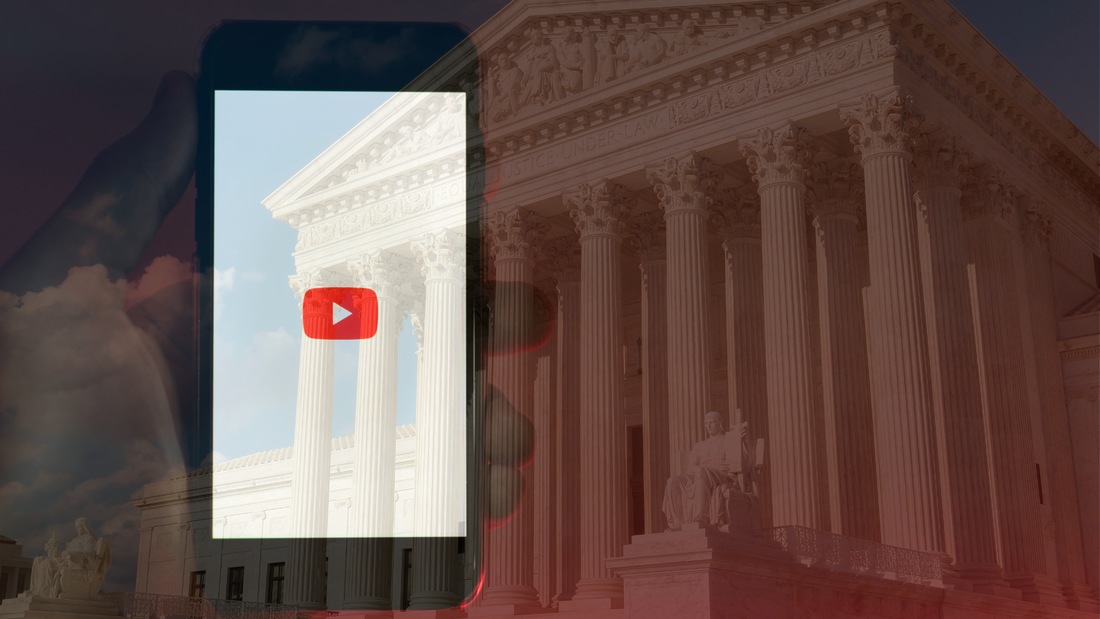
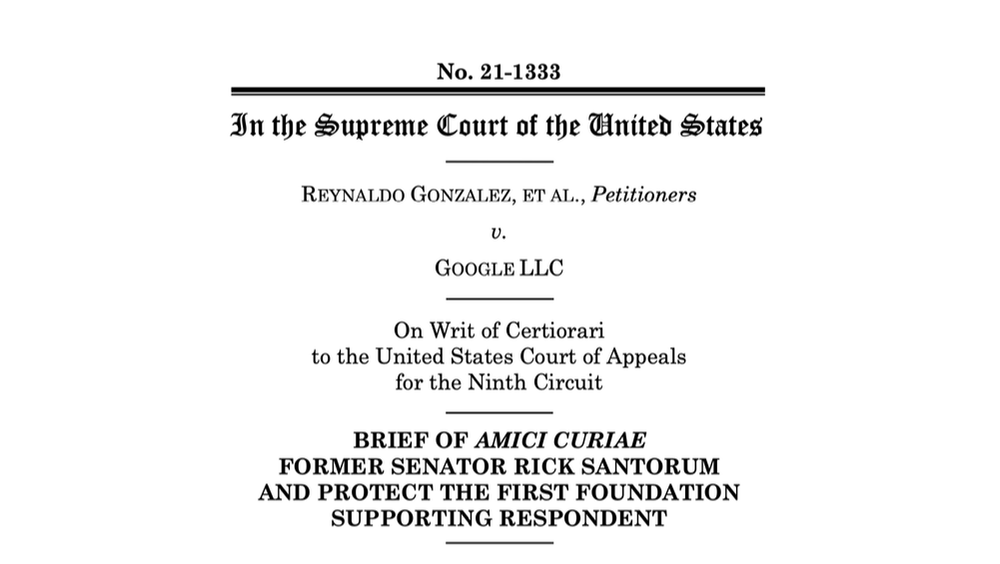
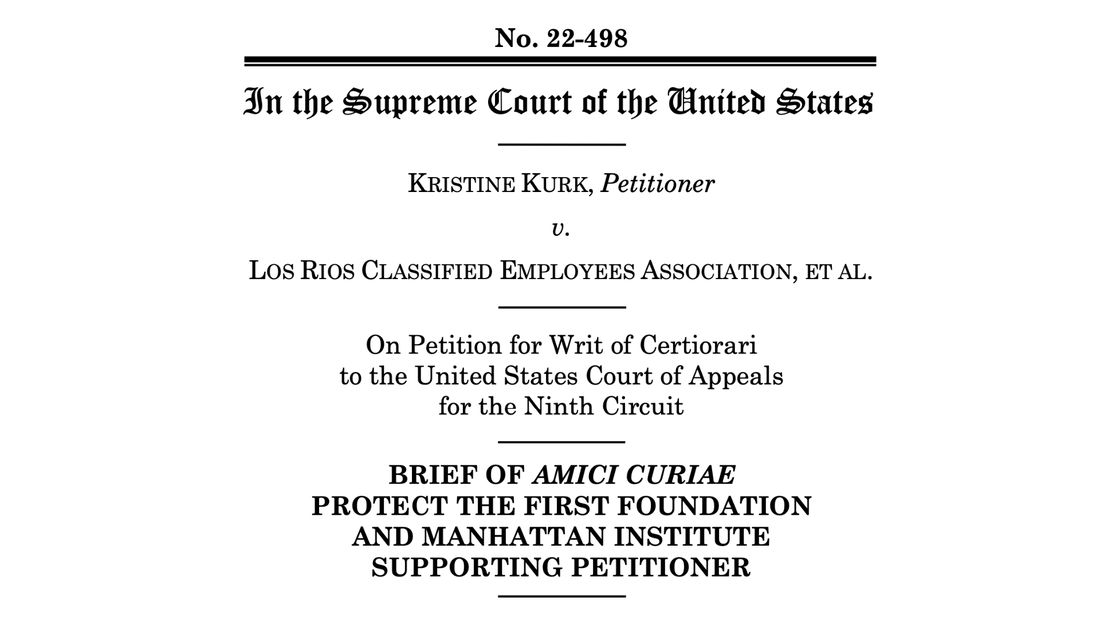
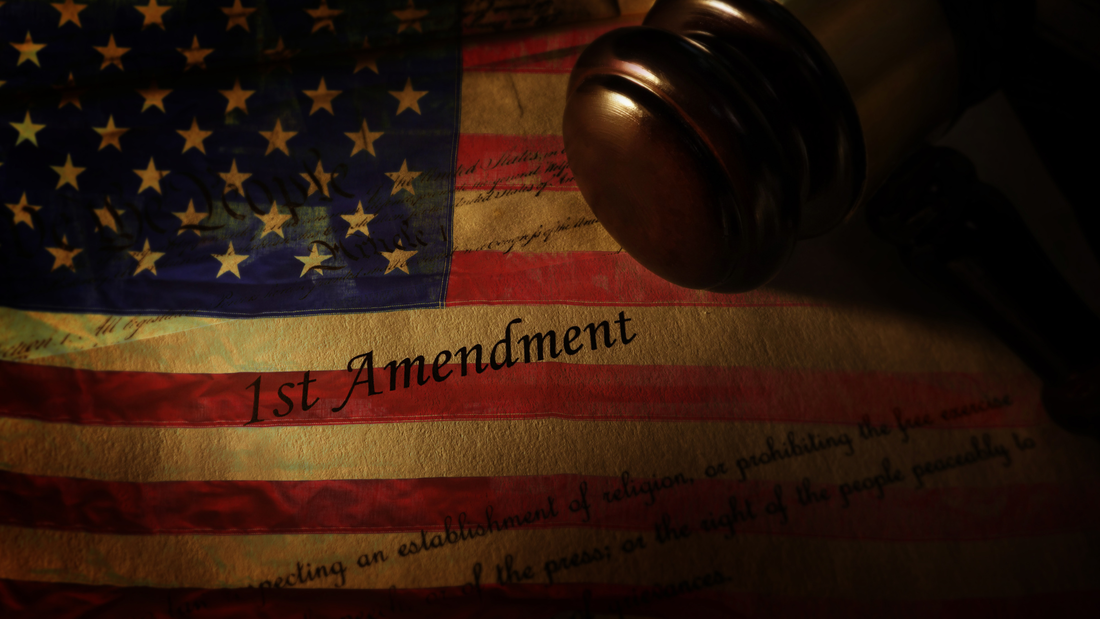
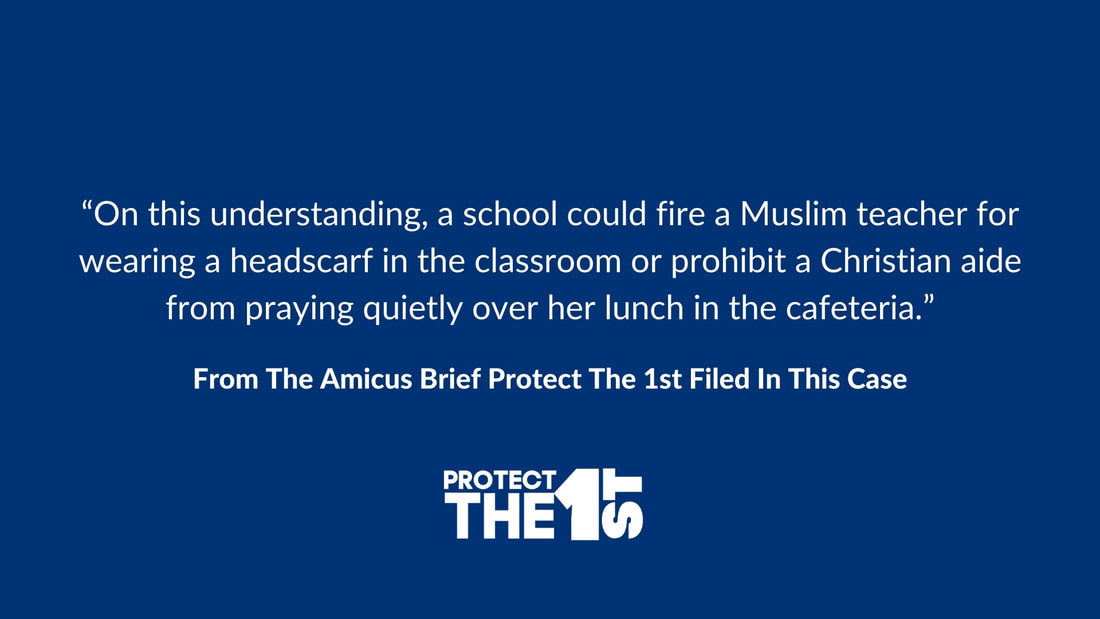
 RSS Feed
RSS Feed